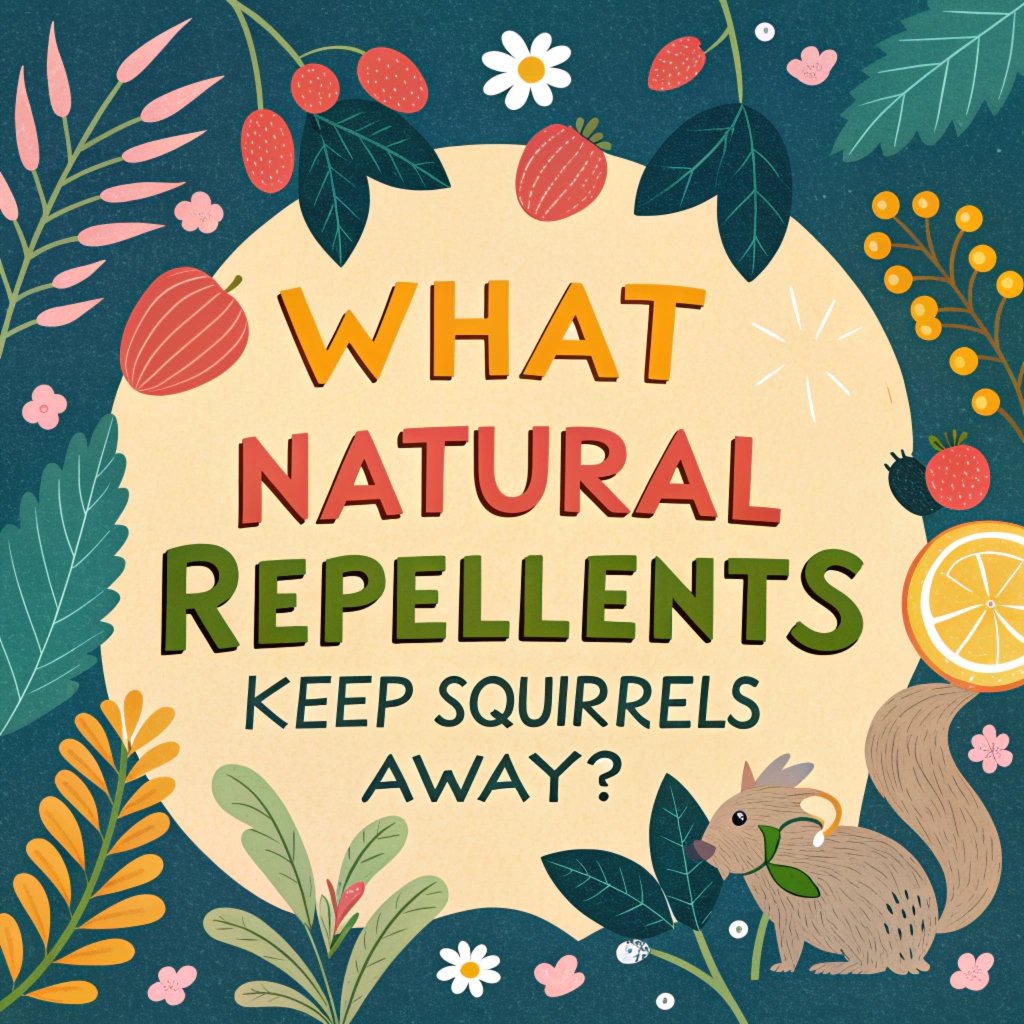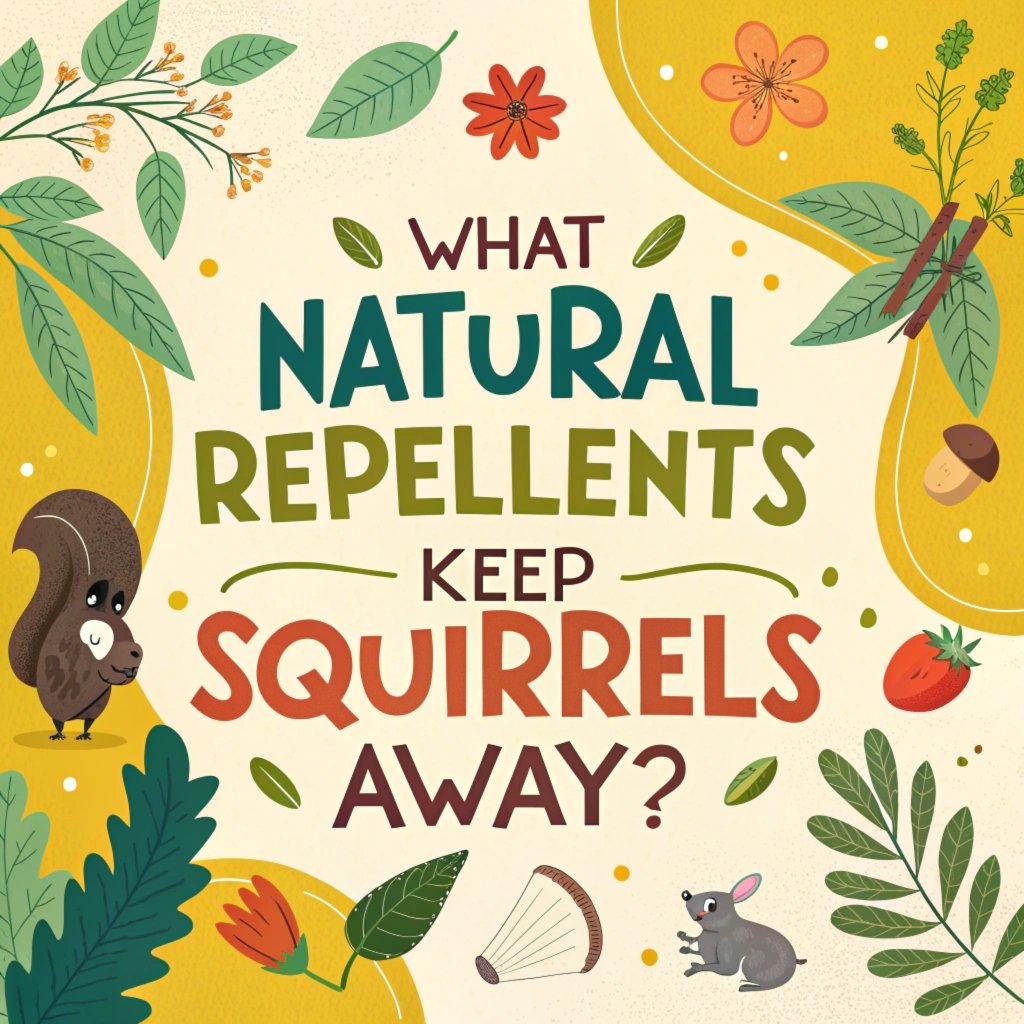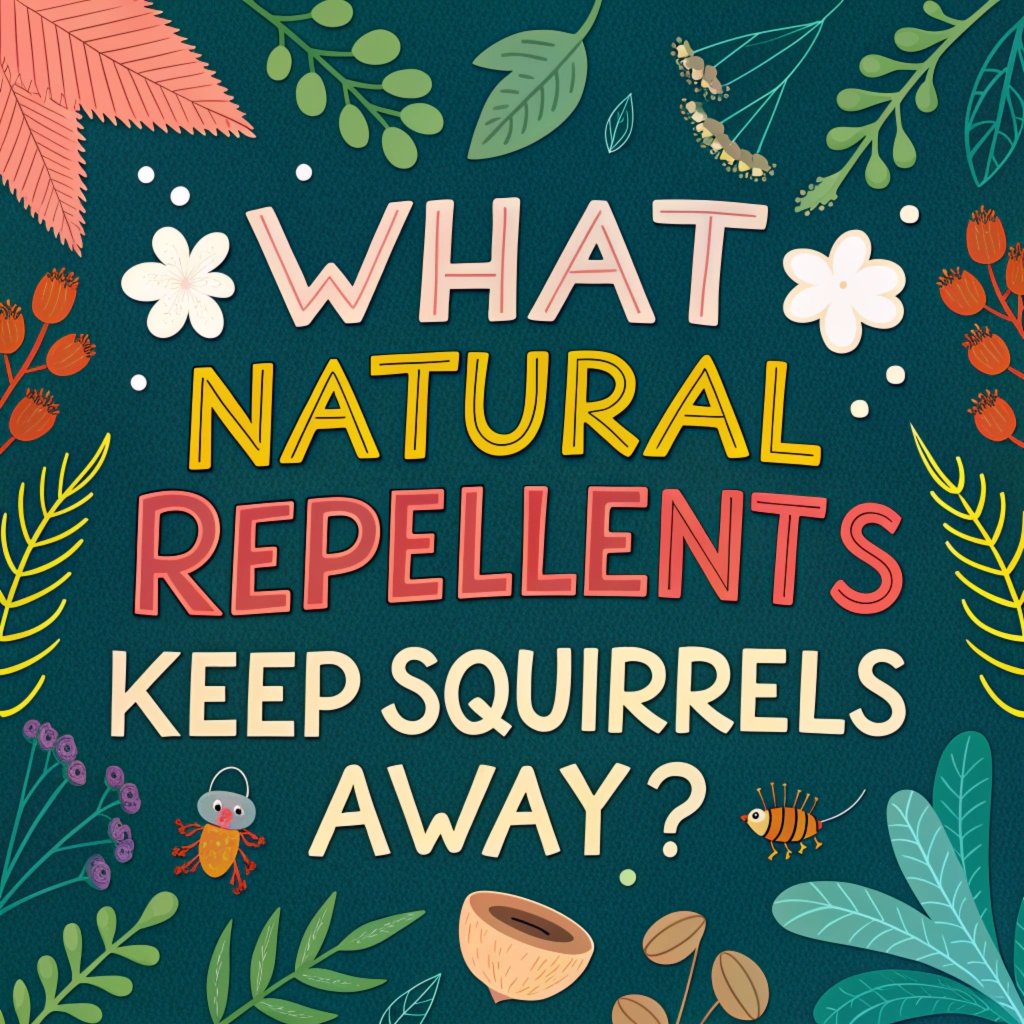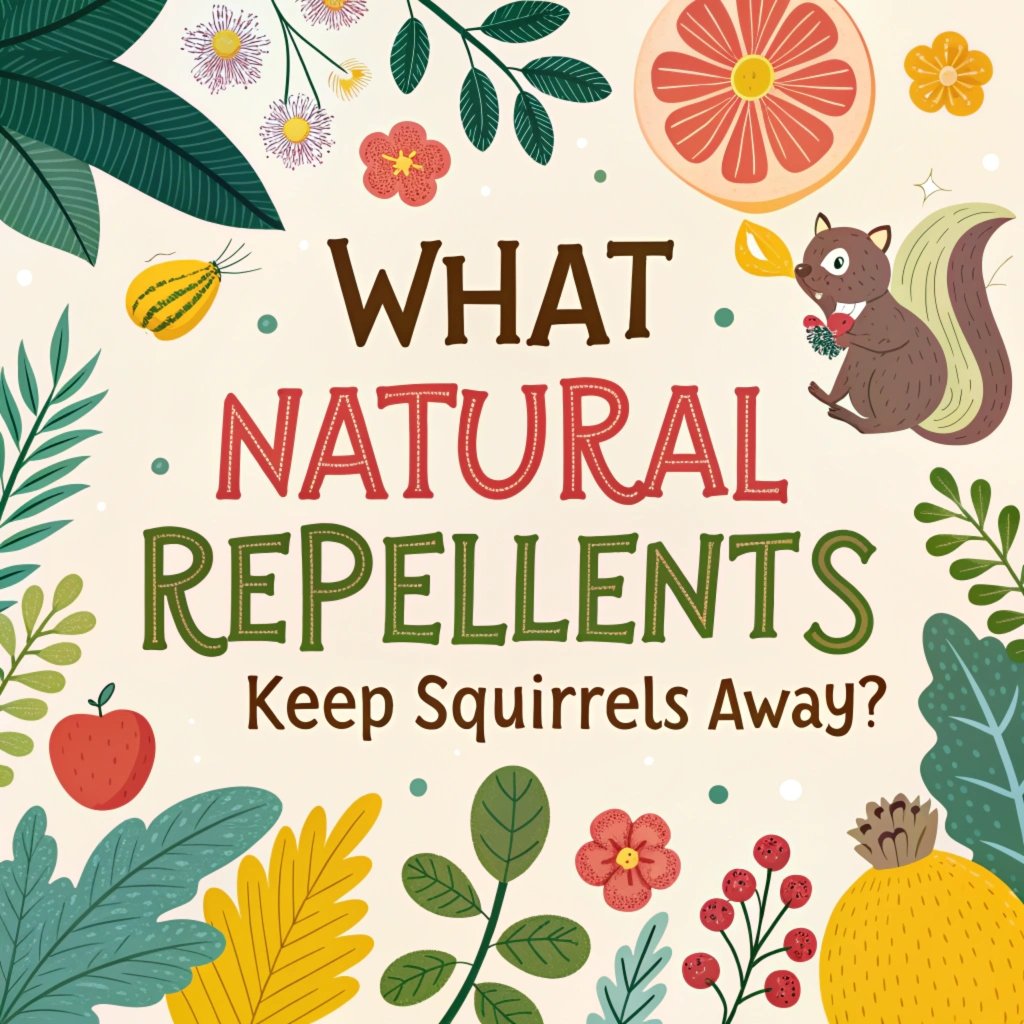What Natural Repellents Keep Squirrels Away? – Humane Pest Control
Squirrels can be charming creatures when observed from afar, but they can quickly become a nuisance when they invade our living spaces.
These agile rodents are known for their ability to cause damage to property, gardens, and even electrical wiring.
However, there’s no need to resort to harmful methods to keep them at bay.

Key Takeaways:
- Coffee grounds: The strong aroma deters squirrels effectively
- Peppermint oil: Its refreshing scent is unpleasant for squirrels
- Cinnamon: Both ground cinnamon and essential oil work as repellents
- Garlic: Its pungent smell keeps squirrels at bay
- Capsaicin: The active compound in hot peppers repels squirrels
- Apple cider vinegar: Its strong odor acts as a natural deterrent
- Rosemary: This herb’s scent is disliked by squirrels
- Geraniums: These flowers emit an unpleasant odor for squirrels
- Mint: All varieties of mint can help keep squirrels away
- Predator urine: The scent of potential predators frightens squirrels
- Essential oils: Various essential oils can be used as repellents
- Dryer sheets: Their strong scent can deter squirrels
- White pepper and black pepper: Both types of pepper repel squirrels
- Nutmeg: Its strong aroma is disliked by squirrels
- Citrus scents: Lemon, orange, and other citrus odors repel squirrels
The Power of Coffee Grounds in Squirrel Deterrence
Coffee grounds have emerged as a powerful natural repellent against squirrels. The strong aroma of coffee, which many humans find invigorating, is actually quite off-putting for these furry creatures.
This makes used coffee grounds an excellent and eco-friendly option for keeping squirrels at bay.
To use coffee grounds as a squirrel deterrent, simply sprinkle them around your garden, particularly in areas where squirrels are most active.
You can also place them in small containers or sachets near entry points to your home.
The beauty of this method lies in its simplicity and cost-effectiveness – you’re essentially recycling a waste product into a useful pest control solution.
It’s important to note that while coffee grounds are effective, they need to be reapplied regularly, especially after rain or when the scent begins to fade.
This natural repellent not only keeps squirrels away but also enriches your soil, making it a win-win solution for gardeners.
Peppermint Oil: A Refreshing Scent for Humans, a Deterrent for Squirrels

Peppermint oil is renowned for its refreshing and invigorating scent, which is beloved by many humans. However, squirrels have a completely different reaction to this aroma.
The strong, minty smell of peppermint oil is highly unpleasant to squirrels, making it an excellent natural repellent.
To use peppermint oil as a squirrel deterrent, you have several options. One method is to soak cotton balls in peppermint essential oil and place them strategically around your property, particularly in areas where squirrels are frequently spotted.
Another approach is to create a peppermint spray by mixing a few drops of peppermint oil with water in a spray bottle.
This solution can be sprayed around your garden, on plants (be sure to test on a small area first), and near potential entry points to your home.
Remember to reapply the peppermint oil regularly, as its scent can fade over time or wash away in rain. This natural repellent not only keeps squirrels at bay but also leaves your garden smelling fresh and minty.
Cinnamon: A Spicy Solution to Squirrel Problems
Cinnamon, a spice beloved in kitchens worldwide, turns out to be a powerful deterrent for squirrels.
The strong, spicy aroma of cinnamon is overwhelming for these small creatures, making it an effective and natural way to keep them away from your property.
There are two main ways to use cinnamon as a squirrel repellent. First, you can use ground cinnamon, sprinkling it liberally around your garden, particularly in areas where squirrels are known to frequent.
Pay special attention to flower beds, vegetable patches, and the base of trees. The second method involves using cinnamon essential oil.
You can apply a few drops of the oil to cloth strips or cotton balls and place these around your property.
It’s important to note that while cinnamon is effective, it needs to be reapplied regularly, especially after rain or when the scent begins to fade.
This natural repellent not only keeps squirrels at bay but also adds a pleasant aroma to your outdoor space.
Garlic: A Pungent Protector Against Squirrels

Garlic, known for its strong, pungent aroma, is not just a culinary staple but also an effective natural repellent against squirrels.
The intense smell of garlic is highly unpleasant to these rodents, making it an excellent choice for protecting your garden and home.
To use garlic as a squirrel deterrent, you have several options. One method is to plant garlic cloves directly in your garden.
Not only will this help repel squirrels, but you’ll also have a fresh supply of garlic for your cooking. Another approach is to create a garlic spray by blending garlic cloves with water and straining the mixture.
This potent solution can be sprayed around your property, particularly in areas where squirrels are active.
For a quicker solution, you can simply place whole garlic cloves strategically around your garden or near entry points to your home.
The strong scent will deter squirrels from approaching these areas. Remember to replace the cloves regularly as their potency diminishes over time.
Capsaicin: The Fiery Defender Against Squirrel Invasions
Capsaicin, the compound responsible for the heat in chili peppers, serves as a powerful natural repellent against squirrels.
This fiery substance irritates the sensitive noses and mouths of squirrels, effectively deterring them from areas where it’s present.
To use capsaicin as a squirrel deterrent, you can purchase capsaicin-based repellents from garden centers or create your own solution at home.
A homemade version can be made by mixing hot pepper flakes or ground cayenne pepper with water and a drop of liquid soap to help it stick to surfaces.
This mixture can be sprayed on plants, fences, and other areas where squirrels are problematic.
Another method is to sprinkle cayenne pepper or red pepper flakes directly on the ground around plants or areas you want to protect.
However, be cautious when using this method, as the pepper can be washed away by rain and may need frequent reapplication.
Apple Cider Vinegar: A Tangy Twist in Squirrel Repellent
Apple cider vinegar, known for its numerous health benefits and culinary uses, also serves as an effective natural repellent against squirrels.
The strong, acidic smell of apple cider vinegar is highly unpleasant to these rodents, making it an excellent choice for protecting your property.
To use apple cider vinegar as a squirrel deterrent, the simplest method is to create a spray solution. Mix equal parts of apple cider vinegar and water in a spray bottle.
This mixture can be sprayed around your garden, on plants (test on a small area first to ensure it doesn’t damage the plant), and near potential entry points to your home.
For a more potent solution, you can soak rags or cotton balls in undiluted apple cider vinegar and place them strategically around your property.
This method is particularly effective near areas where squirrels are frequently spotted or attempting to nest.
Rosemary: An Aromatic Ally in Squirrel Control
Rosemary, a fragrant herb cherished in many kitchens, doubles as a natural squirrel repellent.
While humans appreciate its aromatic qualities, squirrels find the strong scent of rosemary overwhelming and unpleasant, making it an excellent choice for garden protection.
There are several ways to use rosemary as a squirrel deterrent. One method is to plant rosemary bushes around the perimeter of your garden or in areas where squirrels are particularly problematic.
This not only helps repel squirrels but also provides you with a fresh supply of this versatile herb.
Another approach is to create a rosemary spray. Steep fresh or dried rosemary in hot water, let it cool, then strain and transfer to a spray bottle.
This solution can be sprayed around your garden, on plants, and near entry points to your home.
Geraniums: Blooming Barriers Against Squirrel Intrusions
Geraniums, with their vibrant blooms and lush foliage, are not just ornamental plants but also serve as natural squirrel repellents.
The strong scent emitted by geraniums, particularly their leaves, is highly unpleasant to squirrels, making these flowers an excellent choice for both beautifying your garden and keeping pests at bay.
To use geraniums as a squirrel deterrent, the most straightforward method is to plant them strategically around your garden. Focus on areas where squirrels are most active or prone to causing damage.
You can create a border of geraniums around vegetable patches, flower beds, or along fences to create a fragrant barrier.
For a more concentrated effect, you can make a geranium spray. Steep geranium leaves in hot water, let it cool, then strain and transfer to a spray bottle.
This solution can be sprayed around your property, particularly in areas where squirrels are problematic.
Mint: A Fresh Approach to Squirrel Repellent
Mint, in all its varieties, is not only a refreshing herb for humans but also an effective natural repellent against squirrels.
The strong, crisp scent of mint is overwhelming for these small creatures, making it an excellent choice for protecting your garden and home.
There are several ways to use mint as a squirrel deterrent. One of the most effective methods is to plant mint around your property, particularly in areas where squirrels are frequently spotted.
Mint grows quickly and spreads easily, so it can quickly create a protective barrier. However, be cautious as mint can be invasive, so consider planting it in containers.
Another approach is to create a mint spray. Steep fresh mint leaves in hot water, let it cool, then strain and transfer to a spray bottle.
This solution can be sprayed around your garden, on plants (test on a small area first), and near potential entry points to your home.
Predator Urine: Nature’s Warning Signal to Squirrels
While it may sound unusual, predator urine is one of the most effective natural repellents against squirrels.
The scent of potential predators like foxes, coyotes, or even domestic dogs triggers a strong fear response in squirrels, causing them to avoid the area.
To use predator urine as a squirrel deterrent, you can purchase commercial products that contain synthetic predator scents from garden centers or online retailers.
These products often come in granular form or as sprays.
Sprinkle the granules or spray the liquid around the perimeter of your property, focusing on areas where squirrels are most active.
It’s important to note that while effective, predator urine needs to be reapplied regularly, especially after rain. Also, be mindful of the odor, which can be unpleasant to humans as well.
Use this method judiciously, particularly if you have pets or small children who might come into contact with the treated areas.
Essential Oils: A Fragrant Force Against Squirrel Invasions
Various essential oils have proven to be effective natural repellents against squirrels. These concentrated plant extracts not only smell pleasant to humans but also emit strong scents that squirrels find overwhelming and unpleasant.
Some of the most effective essential oils for repelling squirrels include peppermint, citrus oils (like lemon or orange), eucalyptus, and lavender.
To use essential oils as a squirrel deterrent, you can create a spray by mixing a few drops of your chosen oil with water in a spray bottle. Add a drop of liquid soap to help the mixture stick to surfaces.
Another method is to soak cotton balls in the essential oil and place them strategically around your property, particularly in areas where squirrels are frequently spotted.
You can also add a few drops of essential oil to mulch or soil around plants you want to protect.
Dryer Sheets: An Unexpected Ally in Squirrel Control
Surprisingly, common household dryer sheets can serve as an effective deterrent against squirrels.
The strong artificial scents used in these sheets are overwhelming to squirrels’ sensitive noses, making them an unexpected but useful tool in pest control.
To use dryer sheets as a squirrel repellent, simply place them around your garden or property.
You can tuck them into planters, attach them to stakes near vulnerable plants, or even tie them to tree branches. Focus on areas where squirrels are most active or causing the most damage.
For added effectiveness, you can rub the dryer sheets on surfaces like fences or deck railings where squirrels might travel. The scent will linger and create a barrier that squirrels are reluctant to cross.
White Pepper and Black Pepper: Spicy Squirrel Deterrents
Both white pepper and black pepper can serve as effective natural repellents against squirrels.
The strong, spicy scent of these common kitchen spices is irritating to squirrels’ sensitive noses, making them excellent choices for protecting your garden and home.
To use pepper as a squirrel deterrent, you can simply sprinkle ground pepper around areas you want to protect.
Focus on the base of plants, around bird feeders, or along fences and other entry points. Both white and black pepper work well, so you can use whichever you have on hand.
For a more potent solution, you can create a pepper spray by mixing ground pepper with water and a drop of liquid soap to help it stick to surfaces.
This mixture can be sprayed on plants, fences, and other areas where squirrels are problematic.
Nutmeg: A Spicy Secret in Squirrel Repellent
Nutmeg, a spice often associated with warm, comforting desserts, surprisingly serves as an effective natural repellent against squirrels.
The strong, distinctive aroma of nutmeg is overwhelming for these small rodents, making it an excellent choice for protecting your garden and home.
To use nutmeg as a squirrel deterrent, you can sprinkle ground nutmeg around areas you want to protect.
Focus on the base of plants, around bird feeders, or along fences and other potential entry points. The strong scent will deter squirrels from approaching these areas.
For a more potent solution, you can create a nutmeg spray by mixing ground nutmeg with water and a drop of liquid soap to help it adhere to surfaces. This mixture can be sprayed on plants, fences, and other areas where squirrels are problematic.
Citrus Scents: A Zesty Defense Against Squirrel Invasions
Citrus scents, such as those from lemons, oranges, and grapefruits, are not only refreshing for humans but also serve as powerful natural repellents against squirrels.
The strong, zesty aroma of citrus fruits is overwhelming and unpleasant to these rodents, making it an excellent choice for protecting your property.
To use citrus scents as a squirrel deterrent, you have several options. One method is to scatter citrus peels around your garden, particularly in areas where squirrels are most active. The peels will release their scent as they decompose, creating a barrier that squirrels are reluctant to cross.
Another approach is to create a citrus spray. Boil citrus peels in water, let the mixture cool, then strain and transfer to a spray bottle.
This solution can be sprayed around your garden, on plants (test on a small area first), and near potential entry points to your home.
FAQs
How often should I reapply natural squirrel repellents?
Natural repellents typically need to be reapplied every 1-2 weeks, or after heavy rain. The frequency may vary depending on the specific repellent and environmental conditions. It’s best to monitor the effectiveness and reapply when you notice the scent fading or squirrel activity increasing.
Are these natural repellents safe for pets and children?
Most natural repellents are generally safe for pets and children when used as directed. However, some essential oils and spices can be irritating if ingested or if they come into direct contact with skin or eyes. Always supervise pets and children in treated areas, and consider using less potent options in high-traffic areas.
Can I use multiple natural repellents together?
Yes, you can combine different natural repellents for a more effective defense against squirrels. Using a variety of scents can create a more robust barrier and may prevent squirrels from becoming accustomed to a single smell. Just be careful not to overdo it, as too many strong scents might be overwhelming for humans as well.
Will these repellents harm my plants?
Most natural repellents are safe for plants when used correctly. However, it’s always a good idea to test any spray or solution on a small area of the plant first. Some plants may be sensitive to certain oils or spices. Dilute solutions properly and avoid applying directly to delicate plant parts like buds or new growth.
How long does it take for natural repellents to start working?
Natural repellents often start working immediately, as squirrels will detect the scent as soon as it’s applied. However, it may take a few days to see a significant reduction in squirrel activity, especially if the animals are well-established in the area. Consistency in application is key to long-term success.
Can I make my own squirrel repellent spray?
Yes, you can easily create homemade squirrel repellent sprays using ingredients like hot pepper, garlic, or essential oils. A basic recipe involves mixing water with a few drops of essential oil and a small amount of liquid soap to help the mixture stick to surfaces. Always test homemade sprays on a small area first to ensure they don’t damage plants or surfaces.
Are there any plants I can grow that naturally repel squirrels?
Several plants act as natural squirrel deterrents. These include marigolds, geraniums, mint, lavender, and daffodils. Planting these around your garden can create a natural barrier that squirrels are less likely to cross. However, remember that determined squirrels may still overcome these obstacles if other attractive food sources are present.
How do I know if the natural repellents are working?
You can gauge the effectiveness of natural repellents by observing squirrel activity in your yard. Look for a decrease in signs of squirrel presence, such as fewer sightings, less damage to plants or bird feeders, and fewer droppings. Keep in mind that it may take some time to see results, and you might need to try different repellents or combinations to find what works best in your specific situation.
Can natural repellents completely eliminate squirrel problems?
While natural repellents can significantly reduce squirrel activity, they may not completely eliminate the problem, especially in areas with large squirrel populations. These methods work best as part of a comprehensive approach that includes other strategies like removing food sources, sealing entry points to buildings, and using physical barriers where necessary.
Are there any scents that attract squirrels that I should avoid?
Certain scents can attract squirrels rather than repel them. Avoid using products with sweet or nutty scents in areas you’re trying to protect. Common attractants include peanut butter, bird seed, and fruit scents. Be mindful of these when choosing garden plants or outdoor decorations as well.
How do weather conditions affect the effectiveness of natural repellents?
Weather can significantly impact the effectiveness of natural repellents. Rain can wash away sprays and powders, while strong winds can dissipate scents more quickly. Hot, sunny weather may cause some repellents to evaporate faster. In general, you’ll need to reapply natural repellents more frequently during wet or extreme weather conditions to maintain their effectiveness.
Can I use these natural repellents indoors if squirrels have entered my home?
While many of these repellents can be used indoors, it’s crucial to address the root cause of squirrels entering your home. Start by sealing all potential entry points. Then, you can use cotton balls soaked in essential oils or place sachets of strong-smelling herbs in attics or crawl spaces. However, for indoor infestations, it’s often best to consult with a professional pest control service to ensure safe and effective removal.
Are there any legal considerations when using natural repellents against squirrels?
In most areas, using natural repellents to deter squirrels from your property is perfectly legal. However, it’s important to check local regulations, especially if you’re considering more aggressive methods or if the squirrels in question are a protected species. Some areas have restrictions on certain types of pest control methods, even natural ones.
How do I prevent squirrels from becoming resistant to these natural repellents?
To prevent squirrels from becoming accustomed to specific repellents, it’s a good idea to rotate between different types of deterrents. You might use peppermint oil for a few weeks, then switch to a citrus-based repellent, followed by a spicy pepper spray. This variety keeps the squirrels guessing and reduces the likelihood of them overcoming their aversion to any single scent.

Hello, I’m Amelia White, the founder of birdsfanatic.com. As a lifelong bird enthusiast and spiritual seeker, I’ve always been fascinated by the mystical connections between birds and the human experience. On this site, I share my knowledge and insights into the symbolic meanings and spiritual significance of various bird species, exploring their roles in mythology, folklore, and cultural traditions. Join me on this journey into the world of birds, where we’ll discover the hidden wisdom and guidance that these magnificent creatures have to offer.







